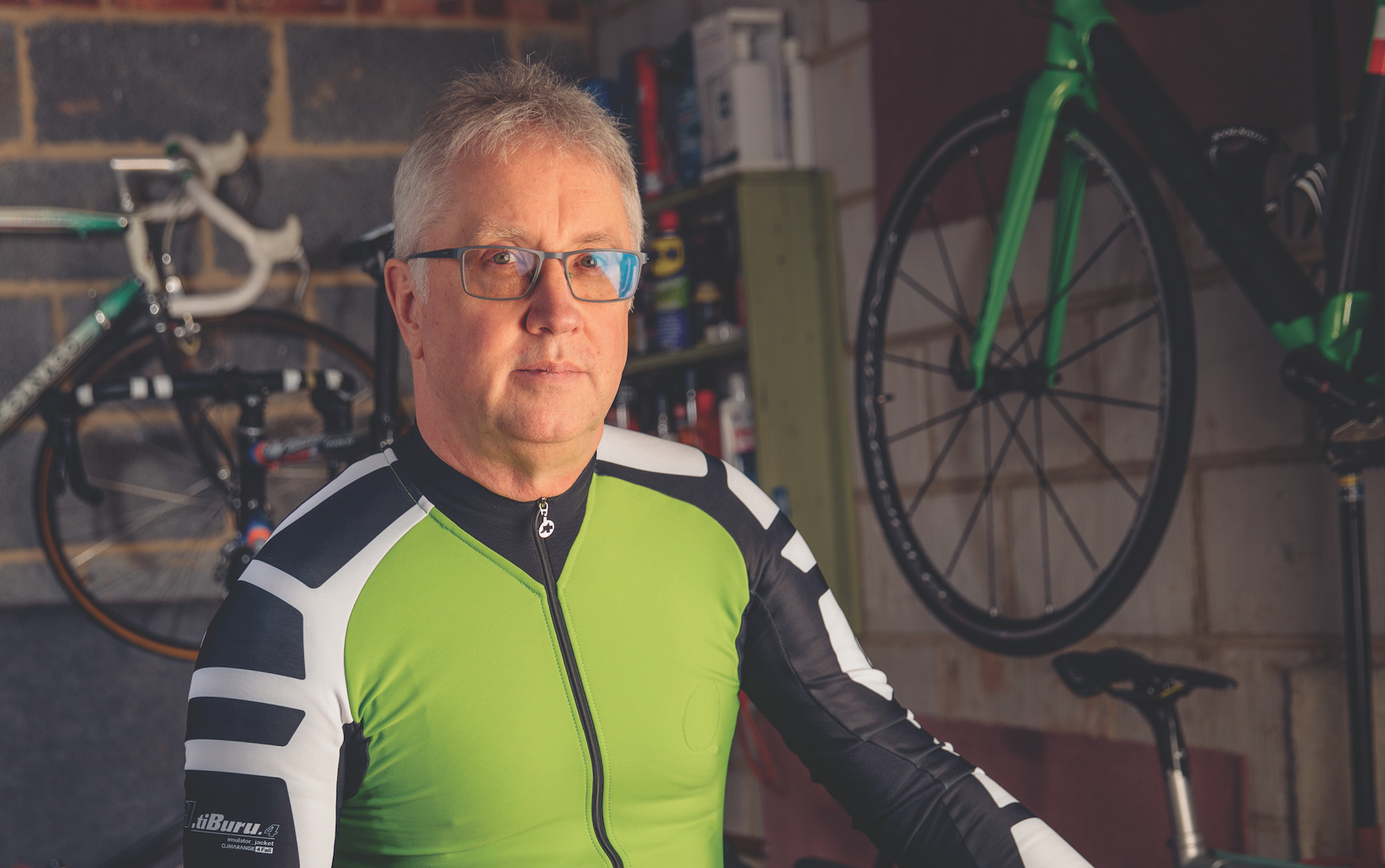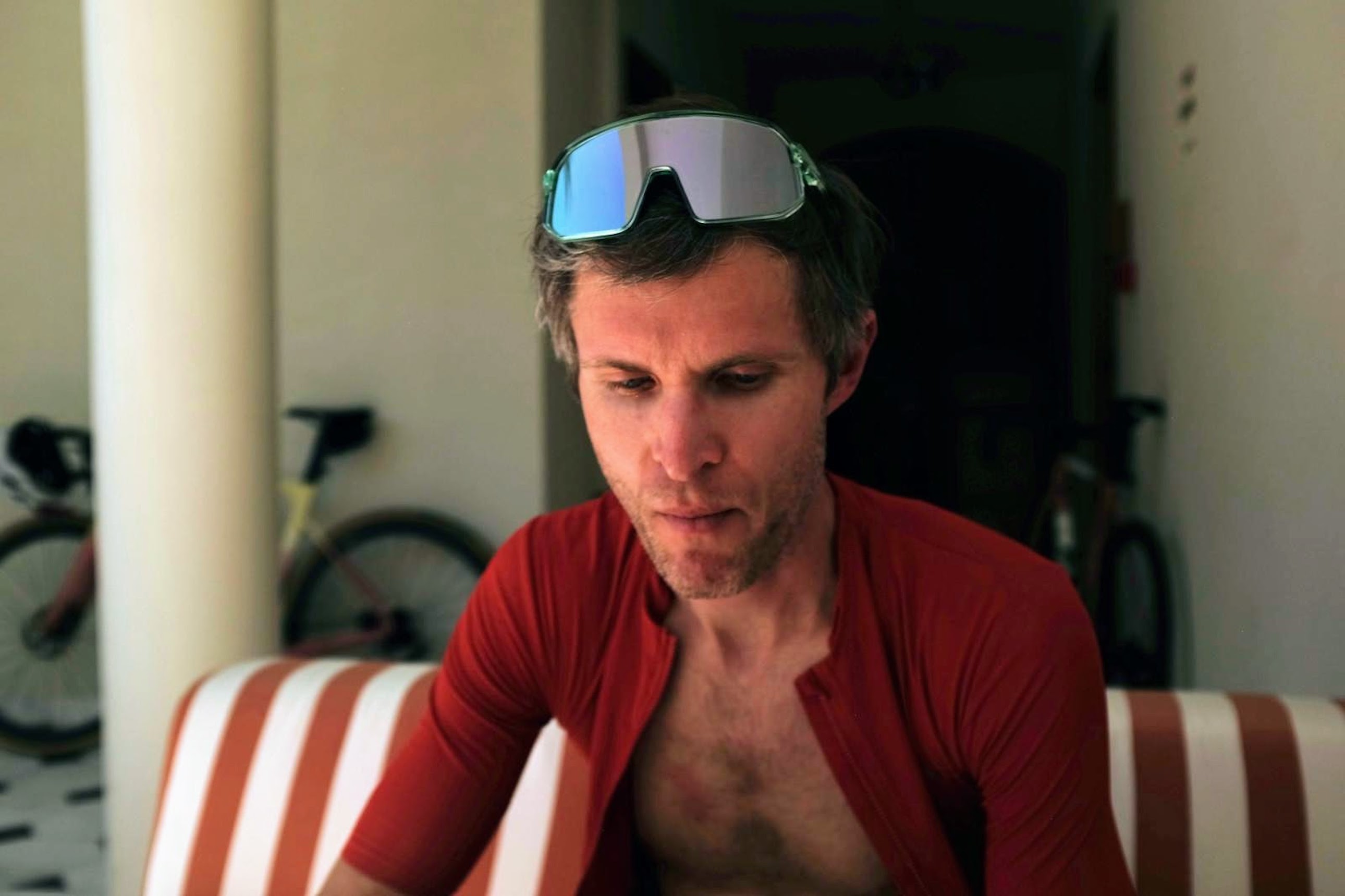‘Overnight my limbs stopped working’: The day one cyclist's life changed forever
Just getting back into cycling after a dalliance with motorsport, Ted Reddick was struck down by a debilitating neurological condition

Ted Reddick (Daniel Gould)

A keen racing cyclist from the age of 18, Ted Reddick was still riding at a good club standard in his early 30s when work commitments started taking over.
"I’d clocked 21 minutes for 10 miles and 56 for 25 – all on steel bikes, none of this carbon stuff," recalls the Colnago devotee. "Cycling for me was everything. But in the back of my mind I knew I couldn’t give it my all because of work."
In the Nineties, after taking a break from cycling to save energy for his career in property development, Reddick turned his attention to car racing – with notable success, becoming a regional champion. He didn’t return to cycling until 2004, when aged 40 he treated himself to a Colnago Dream.
Three years later, his partner Su was diagnosed with cancer, and getting out on his bike became a coping strategy. "Every morning, I’d ride out from Su’s home in Eastbourne, over the marshes or up to Beachy Head. I got fit really quickly."
After Su died, in 2008, Reddick had to rebuild his life – and cycling again dissolved into the background. "I’d bought a [Colnago] C50, but I put it in the garage, put a cover on it and didn’t touch it again for years."
>>> ‘Rohan Dennis memes are my favourite’: Meet the ex-conti rider meme-ing the peloton
By autumn 2018, the Colnago was back in regular use; in fact, Reddick was busy amassing quite a collection of exotic Italian hardware.
Get The Leadout Newsletter
The latest race content, interviews, features, reviews and expert buying guides, direct to your inbox!
"I ended up buying one of Rui Costa’s Team Emirates [Colnago] C60s," he says – and warns me that at this point his story takes another life-changing turn. "The following week, I went away on holiday to Japan and started feeling a nagging pain in my shoulder."
On his fourth day in Japan, while out on an expedition, the minor twinge escalated into far more worrying symptoms. "We were out in the sticks and had stopped for lunch when suddenly I couldn’t lift my arms anymore," he says. "We returned to the hotel, and when I went to get off the bus, my right leg gave way."
He struggled through the rest of the day, and the next morning awoke to a nightmare.
"I couldn’t get up. I crawled across the floor on my hands and knees; I couldn’t even clean my teeth. My girlfriend Zoe had to dress me, and then got me into a wheelchair."

He was wheeled onto a bullet train and sped to hospital in Kyoto, where medics ran myriad tests. "An hour later, a doctor came back and showed me the scan: just below the base of my brain, there was a black mark on my spinal cord."
Further tests confirmed doctors’ suspicions: Reddick was suffering from an extremely rare neurological condition called transverse myelitis (TM), which causes inflammation and compressive lesions on the spinal cord. The effects can be devastating, and only a minority of those with TM ever fully recover.
"Everything was shutting down," recalls Reddick. "I woke up the next morning thinking only, ‘Can I talk?’ – I was terrified that I was going to be locked in. Then my mind turned it all over: would I ever ride or drive again? Would I even walk? What now?"
In 18 days, Reddick lost 10kg in weight; his mobility began returning but only incrementally, with the aid of painstaking daily physiotherapy. He was flown home and continued rehab, one small step at a time.
Now, nearly two and a half years on, Reddick still has little sensation from the chest down and has to use a catheter to pass urine. Only last spring did he finally feel able to get back on a bike.
"I got on my old mountain bike, just for a plod down the road, and it was the worst ride of my life. I was in tears – everything hurt."
His damaged nerves cause a sensation of severe burning as he pedals, and his impaired balance and muscle weakness are such that getting off means dropping the bike on its side.
Nonetheless, he has persisted. "After two months, I got on my Pinarello and did 18 miles at 12mph. I was so fed up – I used to be top of every Garmin segment on that route."
Now 56, Reddick is determined to be as physically active as possible. Last year he competed in the Inter Spinal Unit Games, and is searching for a new competitive outlet. Unfortunately, the condition is so rare that he has struggled to find advice or connect with others who have TM. Acknowledging his altered circumstances, Reddick knows he shouldn’t compare ride speeds to his pre-TM performances, but he has no other yardstick.
"I managed 13mph on the Pinarello, and over many weeks worked my way up to 15.1mph – finally over 15!" Small improvements are big landmarks, and he remains determined to keep pushing himself. "How far can I go? No one knows. For now, I just want to raise awareness – there might be people out there with similar conditions who feel like giving up. To them I say, keep going. It’s all about damn hard work."

Thank you for reading 20 articles this month* Join now for unlimited access
Enjoy your first month for just £1 / $1 / €1
*Read 5 free articles per month without a subscription

Join now for unlimited access
Try first month for just £1 / $1 / €1

David Bradford is features editor of Cycling Weekly (print edition). He has been writing and editing professionally for more than 15 years, and has published work in national newspapers and magazines including the Independent, the Guardian, the Times, the Irish Times, Vice.com and Runner’s World. Alongside his love of cycling, David is a long-distance runner with a marathon PB of two hours 28 minutes. Having been diagnosed with retinitis pigmentosa (RP) in 2006, he also writes about sight loss and hosts the podcast Ways of Not Seeing.
-
 Save £42 on the same tyres that Mathieu Van de Poel won Paris-Roubaix on, this Easter weekend
Save £42 on the same tyres that Mathieu Van de Poel won Paris-Roubaix on, this Easter weekendDeals Its rare that Pirelli P-Zero Race TLR RS can be found on sale, and certainly not with a whopping 25% discount, grab a pair this weekend before they go...
By Matt Ischt-Barnard
-
 "Like a second skin” - the WYN Republic CdA triathlon suit reviewed
"Like a second skin” - the WYN Republic CdA triathlon suit reviewed$700 is a substantial investment in a Tri Suit, and it is, but you’ll definitely feel fast in it
By Kristin Jenny